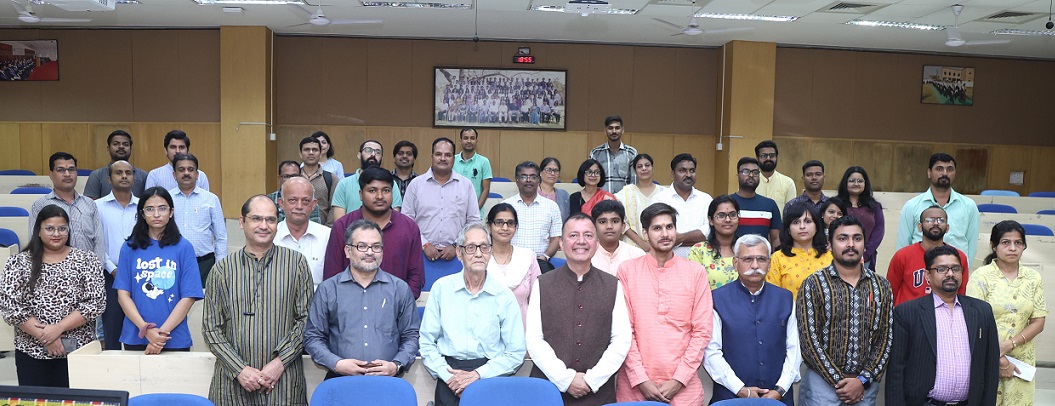Marking the auspicious occasion of Ganesh Chaturthi, IIM Indore has once again launched two language workshops, introducing Sanskrit for the second time and debuting the Odia language workshop. The workshops were inaugurated by Prof. Himanshu Rai, Director of IIM Indore, on September 19, 2023. This marks the institute’s second endeavor in organizing a six-month Sanskrit Workshop due to the overwhelming enthusiasm displayed by the IIM Indore community during the previous edition. As part of its steadfast commitment to cultural preservation and nation-building, IIM Indore has taken a significant step by introducing the Odia language workshop alongside Sanskrit. A remarkable total of 98 community members have registered for these transformative workshops.

In his address, Prof. Himanshu Rai reaffirmed the institute’s dedication to fostering a deeper connection with our linguistic and cultural heritage. He underscored the importance of these workshops in preserving India’s rich linguistic diversity and contributing to the nation’s growth. Prof. Rai expressed his pride in the IIM Indore community’s keen interest in language learning and commended their commitment to embracing Sanskrit and Odia. “These workshops not only provide a platform for language acquisition but also serve as a bridge to our roots and traditions”, he said. Sanskrit, often regarded as the “Language of the Gods,” continues to draw significant attention for its cultural and historical significance. It is a vibrant language with multiple applications, including artistic expression and everyday communication, said Prof. Rai. He also highlighted the importance of Odia in the context of Odisha’s rich cultural tapestry. He noted that Odia, like Sanskrit, is deeply embedded in the region’s values, knowledge, and traditions. Prof. Rai expressed optimism about the impact these workshops will have on preserving and promoting these languages. “Languages aren’t just a means of communication but as the essence of one’s identity. He likened languages to nurturing mothers, shaping individuals into who they are today”, he said. He stated, “Our existence owes a debt to the languages we speak and embrace. Preserving and promoting the diverse regional languages of India is our duty.”
Mr. Pravesh Vaishnav emphasized that Sanskrit, often perceived as a challenging language, is, in fact, as accessible as any other. He drew a beautiful parallel, likening the process of learning Sanskrit to how a mother communicates with her newborn and toddler. He explained, “You listen, you learn. Just as a mother speaks to her child, Sanskrit can be learned through listening and speaking. Children start by speaking, then gradually learn to read, followed by writing, and eventually delve into the intricacies of grammar. The journey with Sanskrit can be just as natural and enjoyable.” He pointed out that while individuals are often identified by their regional languages, such as Marathi-speaking or Gujarati-speaking, there is a larger vision of unity for the nation. “To truly unite our nation, we should all embrace Sanskrit. Instead of being known by our regional identities, we could be called ‘Bharateeya,’ representing the amalgamation of our diverse cultures and languages”, he said.

Mr. Jagadish Mishra, Odia Tutor, took everyone on a captivating journey through Odisha’s illustrious history, firmly rooted in the globally celebrated “Rathayatra” festival. With pride, he highlighted Odisha’s remarkable achievements and the esteemed personalities hailing from the state, ranging from President Srimati Draupadi Murmu to sports champions and cultural luminaries like Padmashree Prafulla Kar. He delved into the profound impact of the Kalinga War on Ashoka, a pivotal moment that transformed him into a spiritual leader. Mr. Mishra also meticulously traced the evolution of the Odia language, paying homage to visionary figures such as Adikabi Sarala Das, Kabisamrat Upendra Bhanja, and Byasakabi Fakir Mohan Senapati. He expressed deep gratitude for the Government of India’s recognition of Odia as a classical language. He passionately encouraged the community to embrace the rich beauty of Odia and actively participate in the Odia Learning Initiative, all while expressing heartfelt appreciation for the institute’s unwavering commitment to nurturing regional languages. As he aptly put it, “Our languages are the vibrant threads of our cultural tapestry, each one contributing to the rich mosaic of our heritage.”
Reflecting on the success of the previous Sanskrit and Tamil language workshops, Prof. Rai extended his heartfelt gratitude to the dedicated language instructors, Shri Pravesh Vaishnav and Sushri Lakshmi Gopalakrishnan, for not only imparting linguistic knowledge but also fostering curiosity and respect for these languages within the IIM Indore community.
The workshops aim to provide a nurturing environment for the IIM Indore community to learn, appreciate, and excel in Sanskrit and Odia, fostering a stronger bond with their linguistic heritage. The event witnessed an overwhelming response from community members, united in their commitment to linguistic exploration and cultural preservation.


